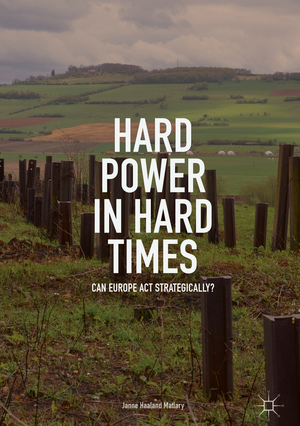Hard Power in Hard Times: Can Europe Act Strategically?
Autor Janne Haaland Matlaryen Limba Engleză Hardback – 4 iun 2018
This book analyses whether European leaders are able to deal with the ‘hard power’ problems of military provocation, mass migration, and terrorism. Russia's 2014 annexation of Crimea was just one example of recent revisionist policies by the state. In 2015, Europe experienced a massive influx of illegal immigrants and refugees whilst also suffering many terrorist attacks in recent years. Common to these policy challenges is the need for using hard power (military, police) in order to confront, stop, stabilize and hinder undesirable outcomes. European politicians are mostly used to wielding incentives-based policy and are unfamiliar with strategic thinking. How well do the British, French, and German governments deal with this triad of hard power problems? What about NATO and the EU? This book examines the responses to determine whether European politicians can still act strategically.
| Toate formatele și edițiile | Preț | Express |
|---|---|---|
| Paperback (1) | 724.80 lei 3-5 săpt. | |
| Springer International Publishing – 19 dec 2018 | 724.80 lei 3-5 săpt. | |
| Hardback (1) | 1002.31 lei 6-8 săpt. | |
| Springer International Publishing – 4 iun 2018 | 1002.31 lei 6-8 săpt. |
Preț: 1002.31 lei
Preț vechi: 1222.33 lei
-18% Nou
Puncte Express: 1503
Preț estimativ în valută:
191.79€ • 200.66$ • 159.32£
191.79€ • 200.66$ • 159.32£
Carte tipărită la comandă
Livrare economică 02-16 aprilie
Preluare comenzi: 021 569.72.76
Specificații
ISBN-13: 9783319765136
ISBN-10: 3319765132
Pagini: 296
Ilustrații: XII, 290 p.
Dimensiuni: 148 x 210 x 18 mm
Greutate: 0.51 kg
Ediția:1st ed. 2018
Editura: Springer International Publishing
Colecția Palgrave Macmillan
Locul publicării:Cham, Switzerland
ISBN-10: 3319765132
Pagini: 296
Ilustrații: XII, 290 p.
Dimensiuni: 148 x 210 x 18 mm
Greutate: 0.51 kg
Ediția:1st ed. 2018
Editura: Springer International Publishing
Colecția Palgrave Macmillan
Locul publicării:Cham, Switzerland
Cuprins
1. External and Internal Shocks: Policy Needs beyond ‘Win-Win’.-2. Strategic Options: Deterrence, Coercion, Containment, Confrontation.-3. Russian Revisionism.-4. Mass Migration and Border Control.-5. Confronting Terrorism and Insurgency.-6. Britain: Still A Strategic Actor?.-7. Germany: Reluctant Ally.-8. France: Strategic and Sovereign.-9. The European Union: “Soft Power is not Enough”.-10. NATO’s Deterrence: Will it Work?.-11. Conclusions.
Notă biografică
Janne Haaland Matlary, DM, is professor of political science at the University of Oslo and the Norwegian Military Command and Staff College. Her most recent book is Ukraine and Beyond: Russia’s Strategic security Challenge to Europe, (Palgrave Macmillan, 2016). She was previously deputy foreign minister of Norway.
Textul de pe ultima copertă
This book analyses whether European leaders are able to deal with the ‘hard power’ problems of military provocation, mass migration, and terrorism. Russia's 2014 annexation of Crimea was just one example of recent revisionist policies by the state. In 2015, Europe experienced a massive influx of illegal immigrants and refugees whilst also suffering many terrorist attacks in recent years. Common to these policy challenges is the need for using hard power (military, police) in order to confront, stop, stabilize and hinder undesirable outcomes. European politicians are mostly used to wielding incentives-based policy and are unfamiliar with strategic thinking. How well do the British, French, and German governments deal with this triad of hard power problems? What about NATO and the EU? This book examines the responses to determine whether European politicians can still act strategically.
Janne Haaland Matlary, DM, is professor of political scienceat the University of Oslo and the Norwegian Military Command and Staff College. Her most recent book is Ukraine and Beyond: Russia’s Strategic security Challenge to Europe, (Palgrave Macmillan, 2016). She was previously deputy foreign minister of Norway.
Caracteristici
First analysis of the three major security challenges to Europe today: Russian revisionism, mass migration, terrorism Determines the ability of western European politicians to address these challenges through detailed case studies Presents a crucial question: when soft power is not the solution, what then?
